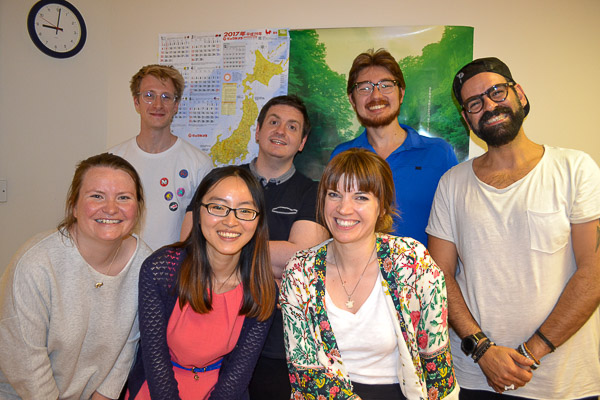
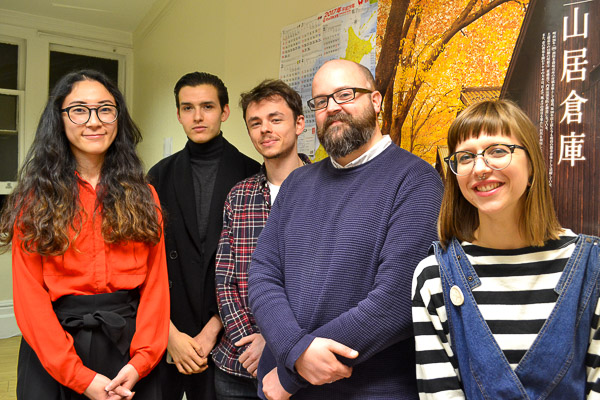
Travelling Japan after ITO classes check wow….. It’s been almost 2 years since started my Japanese classes with ITO and I still remember my first time. At that point I could hardly say a correct sentence and when it came to read and write… Well let’s better say I was no way near it. But immediately I noticed the differences on that years journey to Japan. But the best was yet to come.
2 years in now and we have managed to create a very strong bond with all the Sensei’s in the school. Partly because they want us to make Japanese language part of our everyday life. Thanks to their approach, persistence and method I was able this year to go to Japan and speak Japanese to all my friends hold friendly chats with no major problem. But for me Japanese is very important for another reason. I am planning to move to Japan soon and start my own business there soon. You cannot imagine my and my husband’s surprise (He is a fluent Japanese speaker) when I had my first ever business meeting in Japanese and I was able to present to my Japanese audience my idea as well as my plans for my company. And you know what? They actually understood me 🙂 Even better when they started asking me questions I had become so confident that I was able to answer everything with almost no mistakes and no help. Imagine that!!!!!
This gave me confidence and it is proof of how effective and good is the teaching methods followed in ITO. For all of you people that think that Japanese is difficult and you cannot learn I say: “Naaaaaaaaah just come to ITO and try out. You have my testimony as a proof”.Yannis 29/09/2017
I needed a translator when I was out for dinner with my Japanese supplier back then, and the language barrier made it hard to bond. Last month, I tried speaking Japanese to my supplier at the dinner, and it comes so naturally. I am not an advanced Japanese speaker, but with a little bit mixed with English words here and there, I managed to hold a decent conversation with my Japanese supplier, I think it has a significant positive effect on my business relationship.
At the business dinner, we managed to have a conversation and laughter for a good few hours. At that point, I felt like my Japanese improved drastically.I do not practice much outside of my class; I do my homework when I have the time. However, I tried not to skip my class, and if there are no other choices, I book a replacement class with my tutor. I think consistency is the key. Being an Otaku, I do watch my Japanese anime on a weekly basis, and it helps with my listening skill.
I love what they do in ITO; direct translation does not work for me in Japanese learning. Their methods of making you think in Japanese when speaking Japanese is just brilliant.Chin 27/09/2017
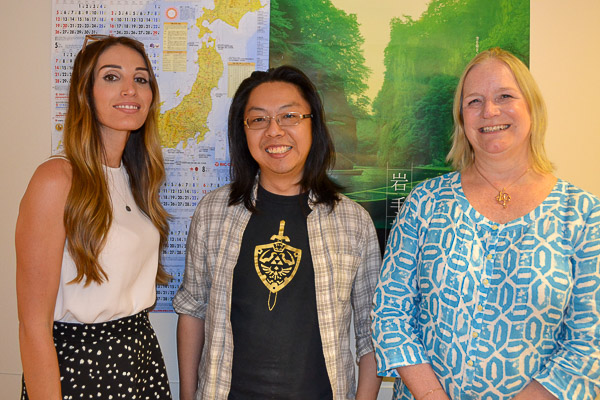
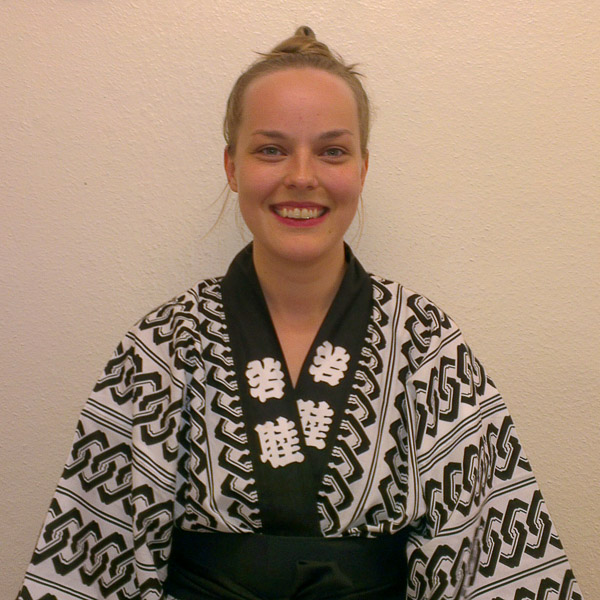
I have been having lessons at ITO for almost a year now. Compared to last year, I have made significant improvements in my spoken and written Japanese. The interactive teaching environment has definitely helped. I am now able to confidently conduct conversations in Japanese, and a lot of times on complex topics like politics or foreign affairs. I am now also able to write long compositions using varied sentence structures, thanks to ample practices from after-class homework.
I practice my Japanese outside the class by watching Japanese TV programmes and listening to Japanese songs. I have also downloaded Japanese podcasts to practice my listening skills.
Tao 22/09/2017
I joined ITO in May 2016 and in the past two years I’ve learned more than I expected.
Japanese is not an easy language for an English speaker to learn, nor is it an easy language for someone who speaks multiple European languages to learn – beyond being used to thinking in multiple languages, you won’t find any of your previous learning helpful.
However, I can say that I have spent two years at ITO, learning to understand and speak Japanese. Not learning ‘useful phrases’ or simple tricks but rather the building blocks of grammar and communication and I cannot now imagine a better use of my time. The friends I have made and experiences I have had are gifts I will cherish.
ITO’s method of teaching involves no shortcuts – there is no English to be seen in their excellent self-produced text book or heard spoken in any of the classes. Even in the corridors, you will be speaking Japanese with other students as you wait for your class, which will be invariably small, friendly and excellently guided by your sensei.
You will be driven by a desire to express yourself with a confoundingly limited vocabulary, using a sentence structure which is just about as alien to English as is possible to be. It will be profoundly frustrating but unquestionably worthwhile as you finally express the joke that’s been rattling around in your head for the last 3 minutes using the simple tools you’ve painstakingly gathered over weeks and months of study.Japanese people will express not just the usual 日本語がじょうずです!but a look of genuine shock when you tell them exactly how long you’ve been studying Japanese (outside Japan, no less). That will be down to your teachers, your fellow students and this marvellous school, one of London’s hidden gems.
John Louis 09/08/2017
I wanted to understand the culture and idiosyncrasy of the country. My goal is to speak fluently, to be able to read between the lines and understand the subtext in a personal conversation.
The class is structured in two parts. One part speaking and one part grammar. Unfortunately, I can’t study at home. I only do Japanese while in the classroom. I can identify progress when reading and listening, wether in the classroom or while travelling.
Oscar 07/08/2017
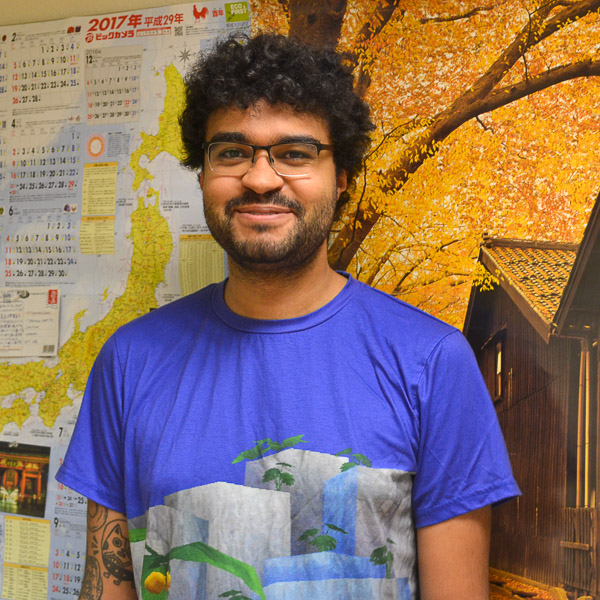
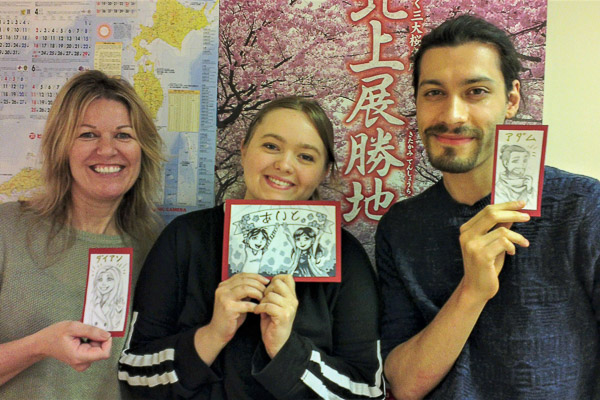
I decided to start learning Japanese drawn by its culture, their way to understand beauty and in order to learn more about its society. I would like to be able to fluently speak the language and reach a good level in kanji reading and writing. The private lessons as well as the group ones are based in oral expression. Following a grammatical timeline, the students are encouraged to speak only in Japanese from the first day so they can apply all the concepts learned. By doing the homework we apply and review all the grammar. Since we put it all in practice with examples and exercises with our classmates, the homework doesn’t feel very heavy but they are always necessary to be able to follow the lessons and keep progressing with the language. Since I started studying with ITO, my listening comprehension and oral expression has improved drastically. Now I can express all my ideas and I’m finding less and less difficulties when it comes to conversations and even when I watch movies and tv shows.
Jorge 03/08/2017
I want to learn Japanese for various reasons. One of them is to be able to speak and work with Japanese companies for business. Another reason would be my interests in games and books in Japan. Very direct approach. We only speak Japanese during our lessons. I am almost forced (in a good way) to really think hard about how should I speak/write in Japanese. I feel I should do more revision and homework myself. Currently I’m just watching Japanese TV or reading interesting books if those count. I wouldn’t say I’m good at Japanese now, but I have definitely improved. This reflects when I was speaking with the teacher and felt I was able to convey more, and when reading books, I felt I was able to understand better. I felt my Japanese was solidly improved since joining ITO Japanese school.
Mingzhi 05/07/2017
I started studying Japanese back in 2013, and spent 2015 at language school in Tokyo. Now in 2017 I am taking 1-1 classes at ITO to keep moving towards my goal of achieving fluency by the 2020 Olympics. I absolutely love my classes at ITO. I am able to tailor the content around my interests and goals, and not only is my teacher excellent, but we also get on really well and make each other laugh every lesson. I have my lessons on the weekend, and I mostly study before class, but I also like to start the weekdays with 20mins of study during my commute. I find this helps me keep making progress, as I am normally too tired after work to study in the evenings.
The moments I feel like I’ve made progress are when I am in Japan on business and find I can communicate smoothly with a client, or when I’m watching Japanese TV and films and realise I don’t need the subtitles. These moments are really important as they motivate me to keep on studying – and I look forward to continuing my studies with ITO into the future!
Olivia 04/07/2017
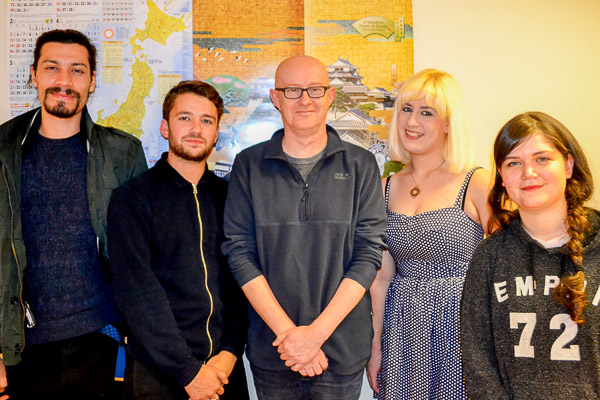

My classes at ITO have been an excellent experience, for better than I expected when I first considered joining. Over the nearly 2 years I spent there I felt more and more at home with my classmates and teachers, able to hold casual conversation and tackle my weaknesses in the language without hesitation. The class structure really nurtured my writing, reading and speaking equally, allowing enough time to each to properly understand the subject. The Japanese only rule was also very encouraging as it promoted getting into the mind-set of thinking and speaking Japanese as soon as you enter the classroom if not before you get there and gives you space to practise and try out what you’ve learnt in a way that doesn’t feel forced. Overall these classes have encouraged me, even after leaving, to continue with Japanese and go to Japan with confidence to try out my speaking skills first hand in the near future.
Alongside the classes, a variety of homework with different layouts allowed me to understand and practise the things I would learn in class. Answering and creating questions with different sentence structures, writing diaries and paragraphs about personal experiences and facts and easy to look back on pages of kanji practise made the revision process a lot easier. I’d also use flash cards to help remember my hiragana, katakana and kanji. I also pushed myself more in class to hold conversations for longer, describe concepts and word meanings to people in Japanese rather than resorting to the English equivalent.
I feel like my understanding of grammar has improved a lot, though I still have a long way to go with it. However, since my first comment I have learnt a lot of new subjects like: how to express feelings, likes and dislikes, actions and their past, present and future tenses, formal and informal forms and a lot more. It really opened me up to understanding casual conversation and understanding expression in Japanese. I would still like to improve my memorisation of Kanji however, that’s something I will work on going forward.
Away from class provided material I used anime and Japanese music to start recognising words and sentences and finding new words to look into. I also got myself a dictionary to look through when needing help with new words and some apps to help with writing kanji on my computer and phone. Apps to practise Japanese with others as well helped a lot, experiencing other people’s sentence structures and speaking styles broadened my understanding of the language.
Kelly 03/07/2017
I used to work in Japan 20 years ago and my wife is Japanese. I decided it’s about time to learn Japanese. My initial goal is to be able chat with my wife and her family, and friends. Let’s see after that. There are 3 students in the class. I joined a couple the class a couple of months ago. The lessons are roughly split into 3. Conversation, homework, and new material. For me, the weekend is the best time to study as I’m busy with work during the week. My wife doesn’t laugh at me so much now when I speak in Japanese.
Lee 02/07/2017
I first started learning Japanese when I moved to Japan! I loved my time there and I thoroughly enjoyed learning Japanese, so when I returned to the UK I decided I definitely wanted to carry on studying. I wanted to keep improving not only my conversational skills, but also my written skills so I am able to communicate better with my Japanese friends and colleagues.
I take a weekly private lesson and I really enjoy it. Every week I leave the lesson feeling I’ve improved a little, learnt something new and had some excellent conversations! The immersive style, no English allowed, is daunting at first but is an excellent way to improve your conversational skills and a fun challenge. The homework given is always manageable and helps you to cement the grammar you’ve just learnt and check you’ve understood. I find kanji challenging and it definitely pays off to study it independently in your own time. I feel like I’ve definitely improved since I joined lessons at ITO, I have better conversations and can explain myself more fluidly and I have a better range of vocabulary and grammar. I look forward to visiting Japan again and being able to have proper conversations with my Japanese friends.
I’m really glad that I chose the ITO language school, I like the style of teaching as my teacher makes the lesson educational but also enjoyable. I’m looking forward to continuing my studies!
Alice 01/07/2017
My vocabulary has expanded and improved significantly over the last year resulting in me forming and utilising much more complex sentences with greater confidence both in and outside of class. I am better able to express my thoughts and opinions – interacting with my teachers and fellow students in natural conversation. In addition to this, hiragana and katakana have become second nature and I am constantly expanding my knowledge of kanji at a steady pace.
There are a variety of ways I practice Japanese outside of class. Writing a summary of my days activities in Japanese, running through verb conjugation on the way to work or listening to the lesson CD helps to reinforce and revise everything learnt in the lessons. The vocabulary cards are a great way of practising regardless of level, forming complex sentences with as many cards as possible whilst using a variety of sentence structures. I’ve found that studying a small amount everyday really helps you become increasingly fluent.Adam 28/06/2017

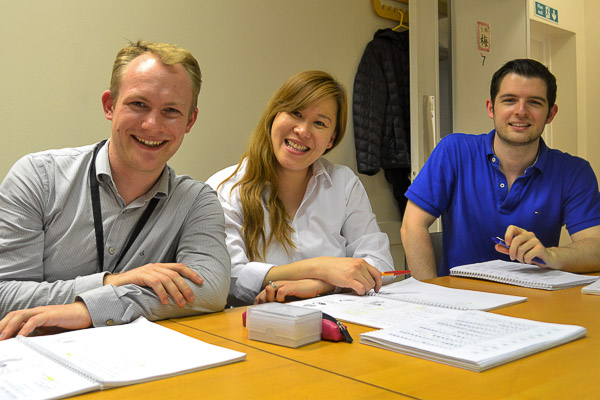
I started at ITO at the beginning of 2016, just after taking the JLPT N3. While I passed the exam, I realised that I could only do Japanese on paper and my conversations were still at the N4 level. I also found that I was only studying the parts that I was relatively good at (grammar) and desperately avoiding the bits at which I’m particularly weak (vocabulary). Part of starting classes was to bring more structure and accountability to my studies.
Thanks to the high level of discussion in a small class, I have been exposed to a much wider vocabulary than I would have through self-study. Even if I don’t know the exact word, I can happily try out different ways of expressing what I mean and not worry about making mistakes, even if I still make a lot of them. At this point, I’m beginning to feel like I’m having conversations that happen to be in Japanese and not stilted textbook conversations. Our class has been together for quite a while, which has a great community effect. We discuss upcoming events, share podcast and drama recommendations, share study tips, and can explore topics in depth, sometimes following up on something that happened weeks ago. It definitely helps keep you motivated when something happens and you’re able to say, “I can’t wait to talk about this in class on Saturday”.
Elspeth 26/06/2017
I have always wanted to learn a new language, and have been interested in Japanese culture for a long time. I’m someone who appreciates both modern technology, and the natural world. Japan always seemed like it has a great blend of these two things living in harmony, so last year I finally decided to search online for a place where I could learn face to face.
After much searching, I decided on ITO Japanese school, because a lot of the bigger places seemed like they would be the standard affair of memorising a textbook, focusing on key words and sentences without understanding the foundations.
ITO classes are conducted in Japanese only! When I first showed up, I didn’t know a single word of Japanese, and often caught myself trying to ask questions in English, but was soon able to piece sentences together using the methods we learned as a group. It might seem confusing at first, but I think it’s the best way to learn, other than actually living in Japan. Group lessons are a really enjoyable challenge. You’re encouraged to bounce questions and answers between each other, and since there’s only 3-6 people in a class, there’s a good vibe all around as you have that friendly sort of competition while learning things together. The smaller group size also allows the teacher to stop and explain things again if you don’t understand something. The teachers are native Japanese speakers, and create a friendly, light-hearted and comfortable atmosphere to learn in. I think they are the key to what makes ITO the great place it is, and I’ll definitely return to further my studies here.
Looking back over the past year learning Japanese, I’m glad I chose ITO. Some advice I can give from my experience is not to get stuck trying to say something, but to find an alternate way of saying it using the vocabulary you currently have. It’s okay to fumble and make mistakes, that’s part of learning a new language! also, get the audio MP3’s, it’s really helpful to hear the textbook being read at fluent speed. Finally, try installing a Japanese dictionary app on your mobile to learn the names of random things, and come up with sentences using what you’ve learned in class. It’s been tough at times, but far better than if I were to self-learn, as the teachers are there to correct and support. Arigatou!
Tahir 15/06/2017
While I had lived in Japan before, I wanted to brush up and be able to practice speaking in a comfortable, non-judgemental environment. My goal is to speak Japanese confidently and naturally, to improve fluency and vocabulary.
My teacher allows for a very adaptive teaching style, based on my needs. We often practice conversation, and then do a structured reading together of an article covering various cultural topics such as education or history. I can then learn kanji and grammar structure through real writings, but also learn about Japanese society. The classes are very interesting, dynamic and personalised.
Finding time to study outside of class is the biggest challenge for me! I watch Netflix shows like Atelier, Midnight Diner and comedy on YouTube. I also try to read some blogs, and occasionally write reviews to talk through with my teacher.
A big turning point for me in feeling like my Japanese had improved was when I actually had a job interview in Japanese! It was tough, but I came out of it well thanks to my teacher’s coaching. I also feel more comfortable watching films without English subtitles, and chatting generally.
Mayuko 14/06/2017



My love of Japan started when I began reading the literature and getting into the culture, and now I’m a fully fledged Japanophile. I lived there for a year, and after coming back to the UK I was on the hunt for a place where I could still learn and immerse myself with the language.
The class is completely in Japanese, so you have to adapt and train your brain to communicate with the knowledge you have. My confidence was low in my speaking ability before starting at ITO, but even after a few lessons I was talking and expressing myself even more than I ever expected.
It’s genuinely amazing that I can now find new ways to communicate even if I don’t know the exact vocabulary or grammar point – I’m no longer bogged down with the “translated” way of speaking and have live, real conversations.
I went back to Japan this year and my ability has improved so much (after about 6 months of lessons) that I was jabbering away to everyone I met and have a deeper understanding of the language than when I was living there.
Finding the time to study and do the homework can sometimes be tricky when you have a full time job – but it’s never too much that I can’t fit it in at the weekend or a weekday lunchtime.
It’s also been fantastic to meet my classmates and spend so much time getting to know them in Japanese. Not only is it great to hang out with people who share your passion, but I’ve made genuine friends and am excited to go to my lessons twice a week and catch up with everyone. ITO is a special place; the teachers are completely invested in our learning and I couldn’t recommend it highly enough.
Nicola 13/06/2017
Friends in Japan tell me my Japanese has improved a lot, which makes me very pleased. And I’ve noticed the improvement as well. I have much more confidence speaking Japanese now. The conversation practice I’ve had at ITO means I can now understand other people speaking Japanese much more easily. I have a lot more vocabulary and grammar. So if I don’t know how to say something, I can often find another way of expressing what I want to say. Also, I can read and write Japanese much more fluidly than before.
I think the way ITO teaches is great, showing how more complex language build on other basic grammatical forms. And any grammar is tied into conversation. So it’s not abstract, but something ready for use. But becoming more proficient at Japanese also makes me more aware of how much I don’t yet understand.
Tyrone 08/06/2017
I started working in Japanese company 5 years ago. Most of the time I was around colleagues who almost never speak English, so I decided to learn Japanese to be able to understand them and to take part in conversations. It worked. Today I am able to attend Japanese karaoke with them and sing Japanese songs. I would like to learn Japanese to be able to speak without any problems, to watch Japanese movies and maybe one day to read books in Japanese.
I don’t have much time to study at home as my work required not only long working hours but also sometimes working from home and weekends. My teachers are helping me as much as they can during the lesson.
Although I was able to communicate during my trips to Japan, the first time I feel my Japanese has improved when I was able to explain to my teacher how my week was, what I was doing and so on.
Anna 08/06/2017
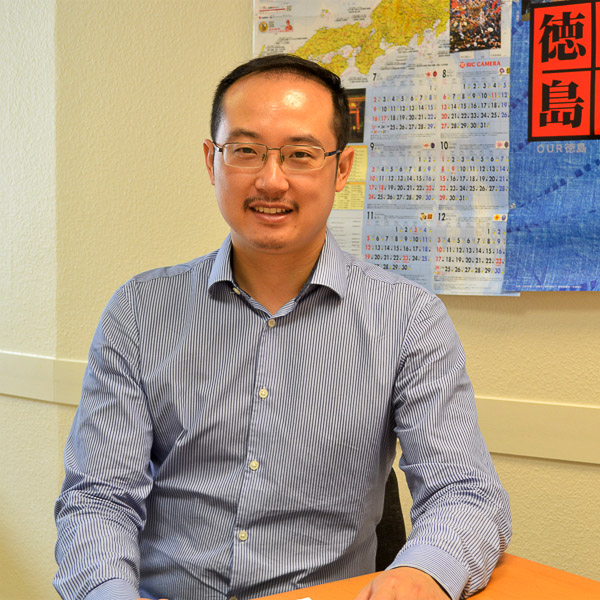
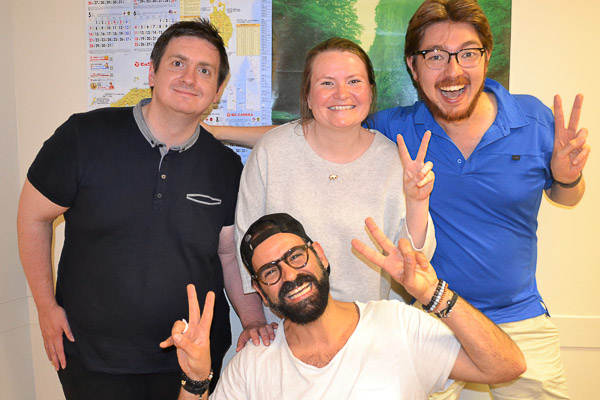
When I started studying Japanese last year, my short-term goal was being able to communicate with my wife’s family. As a long-term goal, I would like to have the option to go live and work in Tokyo — and if I aim for a job similar to the one I hold in London, I need a fairly good command of the language. There are 4 pupils in my class. That way, even though everyone has strengths and weaknesses, we can make good progress while making sure no one is being left behind. For instance, my speaking skills are the weakest of the group, but I can still participate and learn at the same pace as others.
Doing the required homework is very manageable: it takes maybe two hours every week. I usually take advantage of my lunch break for writing assignments.
This leaves a comfortable amount of time for complementary study: vocabulary/kanji flashcards during morning commute, watching Japanese TV and movies, writing/talking with my family…
When I first met my wife’s parents in February 2016 (as I had just signed up for school), she had to play interpret both ways. They are very nice people, and the evening we spent together was pleasant, but there was a definite communication gap.
When we visited them again a year later, we were finally able to communicate directly.
Gregory 06/06/2017
Since my last comment in 2016, I can definitely express myself more in Japanese and have conversations with Japanese people. Even though I do not always know what exactly is being said, I am able to understand what the topic of the conversation is.
I have improved in confidence in speaking Japanese. Before I was hesitant and I didn’t really want to say anything, whereas now I can start a conversation and reply to someone much more easily.
Outside of the classroom I practice in a few ways depending on where I am. At work I will listen to Japanese podcasts or language tapes, at home I will read the textbook and workbook or even watch anime/dramas if I have the time. I also joined a conversation exchange program, which was very beneficial for reading, writing and speaking practice.
Bryony 05/06/2017
I feel that my Japanese has improved vastly in the past year. We’ve primarily been focussing on grammar in class, which has been very useful. As well as expanding my vocabulary I’ve also noticed that I can read and write kana much faster than I could previously and without having to think about it too much, it flows more naturally. I’ve also noticed improvements in terms of communicating my thoughts and ideas in Japanese; I think this is primarily down to the method of studying at ITO, being forced to problem-solve in Japanese only without the option of resorting to using English.
Aside from my weekly classes at ITO, I practise speaking with friends and colleagues.Lately I’ve had the opportunity to use my Japanese language skills as part of my work which has been highly rewarding.
Aaron 05/06/2017
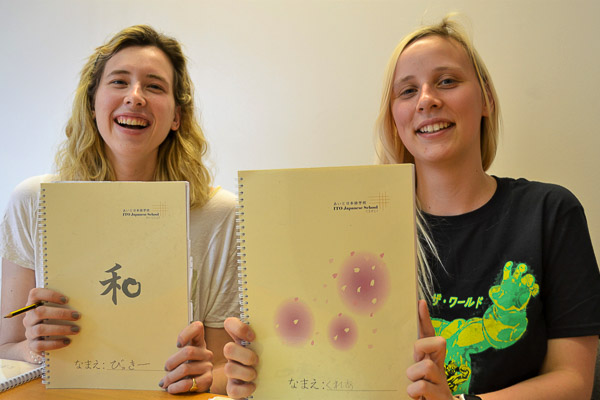
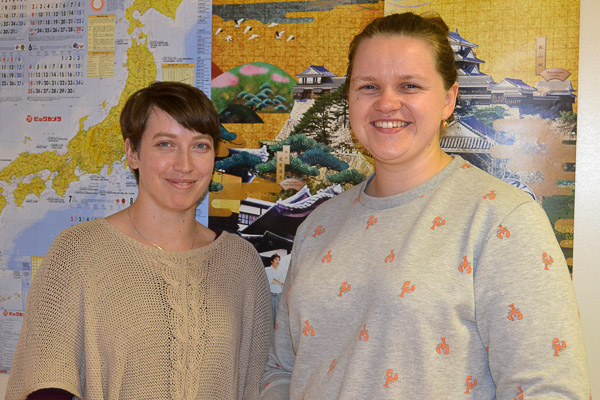
Since 2016, my Japanese improved gradually and a lot as ITO Japanese School has great teachers that take time to explain each grammar.
When you have reached N4 level (and now studying to pass N3 level), you don’t have any English written in your textbook anymore, so you get used to only read in Japanese and mostly improve your Kanjis. I am also in a group of 2 persons which allow me to speak more Japanese during class.
I am learning new grammars and Kanjis every week, so I try to practice even after class with my classmate on the way back home. Also, with my classmate, we are organising Japanese/English language exchange as much as possible, which is a great way to exercise our conversation in Japanese, learning new vocabulary and different forms of communication.
Marie-Anne 04/06/2017
It has now been 4 years since I started with ITO and recently got back from another amazing trip to Japan. The difference between this and my last trip was staggering and being able to comfortably move around a city, order food or converse with shop staff with confidence made a huge impact on my time there.
This year, my friends in Osaka and I even decided to try the challenge of spending a whole day speaking only in Japanese and being able to do this has been a highlight of my studies so far. I think that a key area of improvement for me recently is the speed at which I can speak and read Japanese (although I aim to improve even more!). This is largely due to ITOs 100% Japanese method which forces you to think in Japanese. Previously, I found it easy to communicate via text and email with my Japanese friends as you have time to read and absorb what is written before formulating an answer but real time conversation had always proved difficult. Now I’m able to understand statements and give replies much quicker making face to face conversation much easier.
I think the key to improving and maintaining any kind of skill is to use it and so I am always keen to use my Japanese where possible. There are regular conversation exchange meet ups where I’m able to practice and through my studies I have met some great friends, not only from Japan but all over the world. I also try to watch Japanese films and Television Programs for listening practice and it’s interesting to revisit films I’d seen long ago and see how much I can understand now that I can speak some of the language. I’m looking forward to another year of improvements. It may be a tough language to learn but the rewards are many.
Luke 03/06/2017
I wanted to understand Japanese shows without subtitles and maybe work in Japan one day.
We have a small class size, each lesson starts with casual conversation in Japanese before moving on to revision or introduction of new terms. Because everything is taught in Japanese it’s a very immersive environment. Homework doesn’t take too much time, just a few hours a week. I listen to Japanese radio to improve my listening, and just try to read and review something every day. It’s not a lot of work if you do something small every day. I’m starting to catch more words and phrases when I listening to songs or watch shows now, the Japanese conversations in class also flows quicker now. Even if I don’t understand completely, sometimes I can guess what the conversation is about from context. It’s been a huge improvement for me!
Gao 05/06/2017


I work for a Japanese company. I would like to be able to read e-mail in Japanese and also talk to my Japanese colleagues in London. Usually we have 3 or 4 people in class. We chat about our lives before moving on to learning new vocabulary and grammar. The class is relaxed and fun. I study on Sunday and at lunch time and also while I am commuting.
I can understand many words used by my Japanese colleagues and can get the gist of a conversation. I am also watching some Japanese TVs on Netflix. I really enjoy my class.
Nina 04/06/2017
I’ve always been a fan in Japanese culture and started to watch Japanese dramas/listen to J-Pop since high school. I did a two-month Japanese course a few years ago but did not continue studying given other commitments. Luckily, I found ITO when I decided to pick up Japanese again last year.
What I really like about ITO is its unique teaching style and small class size. You get so many opportunities to practice actually “using” the language rather than blindly memorising grammatical rules. During each lesson, besides studying the textbook we will spend a lot of time just chatting. The topics could range from what happened to each other during the week to current political issues – of course all conversations in Japanese. This is not just a really fun and relaxing way to study, but also trains you to think like a native. I have definitely gained more confidence speaking the language, and now I am more able to enjoy Japanese dramas/songs.
As a working professional, sometimes it can be a bit challenging to juggle work and study. However, I don’t see it as a problem at all. To me my Saturday Japanese lessons are like de-stressing sessions, or catch-up time with a group of wonderful friends (both teachers and classmates). There is also a lot of flexibility in terms of lesson arrangement, which can help me plan in case of special circumstances.
Tao 30/05/2017
My mother, who is Japanese, always told me how difficult the language is. As I was growing up in Germany, I did not learn it when I was young. I visited Japan, where I have relatives, quite late in my life. Most of my relatives spoke English. I never thought about learning to speak Japanese and it happened quite by chance. I was looking for a computer course at an institute and while I was browsing their catalogue, I found a beginners’ class in Japanese had just started. I forgot about the computer class and signed up for Japanese instead!
If my Japanese relatives can make the effort to speak English, I should do the same in Japanese.
I have been studying the language for quite a few years and it still strikes me what a difficult language it is. However, when I look at something I have written in Kanji, it gives me quite a thrill and sense of achievement. As there so many aspects to learning the Japanese language, such as grammar, vocabulary and Kanji etc , I could spend all day on it. I try to do a bit a day which is not always possible and on other days more. In class I agonize that I get many things wrong, but when I am in Japan all my hesitancy seems to disappear and I really enjoy being able to communicate in Japanese. This is especially true with my relatives.
I take a private lesson which suits me best. I like to learn at my own speed.
Ingrid 30/05/2017
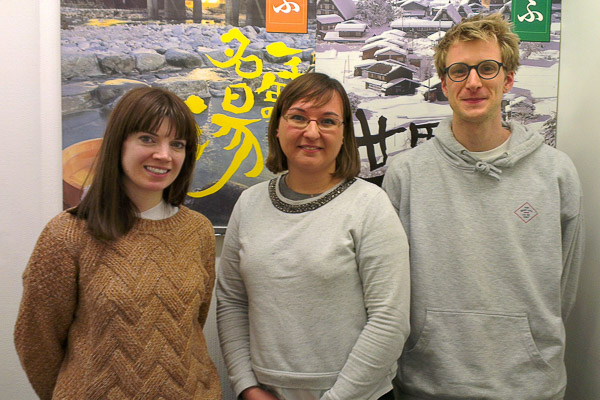
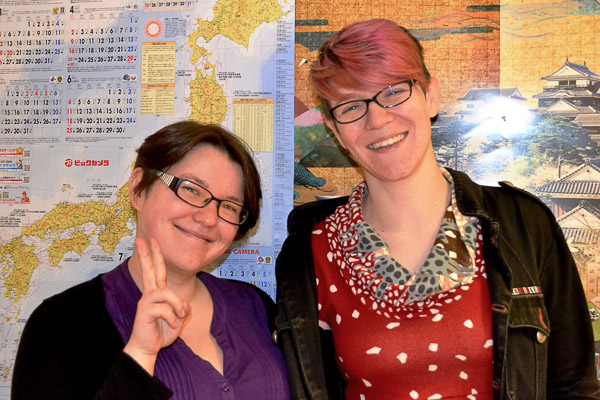
I feel that I am able to understand a lot more Japanese through listening and reading. I am now at a stage where I can recognize various kanji and I feel I can read these with more ease and interpret sentences better. My knowledge of different verbs has improved, as has my vocabulary. The classes are hard, we have studied a lot over the last year but I really feel that my classmates and I have improved significantly. I feel that my technical knowledge of grammar has improved considerably, however I am aware I need to practice using different verb forms – as I find these very tricky! I have tried to listen to Japanese people talking and focus on inflections and stresses, as I often stress words as I would do in English – this is not correct! I think that by listening and speaking more in class, my speaking ability is slowly improving. It is very important to study on a regular basis, outside the classroom. Learning new vocabulary is also essential to improvement. I enjoy watching Japanese television shows online, and I feel that I understand a lot more than I did a year ago. I also listen to podcasts, Japanese singers and read Japanese e-books –I try to expose myself to as much Japanese language as I can, and work it into my daily life.
Vanessa 25/05/2017
I’ve been interested in Japanese pop culture for years. It seemed appropriate to learn the language so that I could learn more about Japan. I hope I could become a proficient Japanese user. The classes at ITO are rendered in an interactive and dynamic manner. With the small class size and the Japanese-only class rule, we are able to practise speaking skills and improve understanding of the language. The homework is reasonable and I normally manage to have it done after work. But I feel extra time needs to be put in to really harness what is taught during the class.
I took lessons at another institute where I got to know the basics and stopped for a couple of years before restarting learning Japanese at ITO. Upon joining the class, I felt I lagged behind my fellow students, especially with regard to speaking and grammar. I was only able to make simple sentences without using conjunctions at all when I first started. But as my study goes, I’m gaining more confidence in expressing myself using more complex structures.
Ying 24/05/2017
I decided to learn Japanese after the company I work for was bought by a global Japanese insurer. Japanese people were slowly being introduced into the business and I started to realise how much I love their culture. I then made a visit to Tokyo and fell in love with it. From that point, I knew it was a language I wanted to master. So I made it my New Year’s resolution for 2017 (something which I have never stuck to before!). I could never have imagined I would be as far along as I am. In January when I received my ITO School text book, it looked overwhelming and I wondered if I had bitten off more than I could chew. Just a few months in, I can read hiragana and some kanji as quickly and confidently as I do in English! My end goal is to be confidently conversational, and to pass JLPT 5,4 & 3. Although, to be at a point where I can watch a Japanese film or series without subtitles would be incredible.
Our class structure is very unique. We begin with casual chit chat, about anything from our weekends to what we had for lunch or what we got up to on a holiday. English is forbidden the moment you walk through the door. At first I thought this was a bit harsh, but I realise now, it is the reason we have been able to move ahead so quickly. It will get us to a point where we think in Japanese, as opposed to thinking in English and translating it into Japanese in our heads before speaking. We then move on to some theoretical work, and talk it through until we all understand.
Finding time to study is not simple when you have a busy job and home life. However, if you really want to learn, you will just find the time. I take my text book and work book everywhere. They stay in my bag and come out any time I have a spare 10 minutes.
I sometimes have a moment of realisation when I am in class. Before I started learning, I remember watching a video of students in a Japanese language class and the teacher was chatting away and the students were laughing. I remember thinking how incredibly cool that must be, for them to understand what she was saying. And now I realise….that’s me! We have a real laugh with our sensei – all in Japanese. I have always had a little motto, that when you can crack jokes in another language, you’re getting somewhere. And we do, often.
All in all, I think it is important to take it step by step and not to bog yourself down with how long it takes to be fluent in both speaking and reading. Just enjoy every step and remember to keep looking back at where you were when you started!
Brigitte 23/05/2017
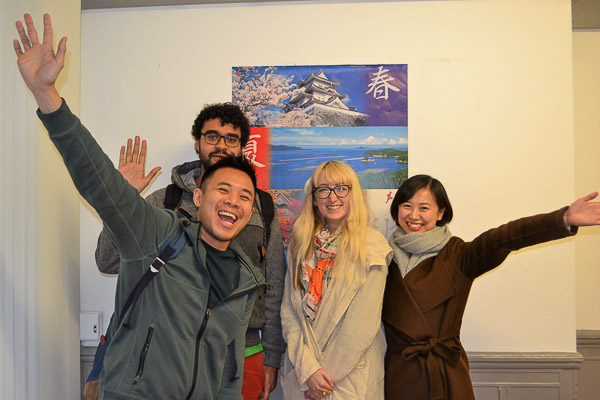

Compared to last year, I feel my understanding has improved. When I went to Japan in January, I definitely felt like I could grasp what people in shops, etc were saying to me, more so than before. I’m sometimes surprised how long a sentence I manage to string together, and (I hope) my sentences are beginning to sound more natural. It may be that I don’t often use some of the grammar that I’ve learnt but I hear it and I recognise and understand it and I feel good about that.
Grammar has always been my strong point, but I still feel it improving and growing. I definitely know more vocabulary then before too. Sometimes I’m surprised what words stick in my memory.
Marie-Anne (my classmate) and I tend to communicate in Japanese even outside of class. It helps us to continue practicing even when we don’t meet Japanese people. We are also trying to set up regular language exchange meetings with Japanese females in London. In addition, when I can, I will chat with my friends/in-laws in Japan using LINE. It also helps that I can sometimes speak with my husband in Japanese, though we mostly use English.
Laura 22/05/2017
My reasons for picking up Japanese were quite a few. First one is having a long lasting interest in the Japanese culture. I am very passionate about movies from Kurosawa, Kitano, Miyazaki and many other renounced Japanese directors. Another strong reason was my interest in Martial Arts. I used to do Judo for 2 years and Karate for over 8 years and am currently training Muay Thai. However, my main reason is definitely my fiancé, which is Japanese. Understanding her culture and language is both fun as well as useful.
I am currently studying beginner level Japanese. My private classes are focused mostly on the grammar and sentence structure. Usually we start with a little casual conversation, repeating both vocabulary as well as topics of the past few lessons. Next, we go over homework and do corrections, mostly to correct understanding on how to use the grammar. Lastly, we cover a new material in a form or reading, than writing and close the session with some speech practice.
Finding time to study is difficult. I work for a marketing agency as a senior account manager and especially at times when we are on boarding new clients it is very challenging to find extra time in between martial art trainings and job. I try to find 1 hour per day for study and cover the material of school, when I have some extra time in the weekend or few minutes in tube, I either watch Japanese movies, listen to listening materials provided or use various mobile apps to learn additional vocabulary.
Mostly, when you go through the phase when you get a bit frustrated, if you push through, you will get rewarded with new level of understanding and more practiced speaking. I remember one session in particular, when I was feeling a bit overwhelmed, but thankfully to patient effort of the ITO teachers I was finally able to grasp the difficult grammar bits of the grammar and apply them with more ease on the go.
I recommend ITO school if you want get good understanding both culture and language, especially the thought process of Japanese people. They have very well structured materials, addressing all possibilities of grammar use you can encounter in the language, leaving no stones un-turned. I also recommend taking their materials as a guideline and expanding on it with your own additional studies. It is both helpful as well as a lot of fun 🙂
Matej 22/05/2017
I decided to start learning after making a visit to Japan in September 2015. My love for the country and culture was so great that I decided I needed to study so that it may be possible to live and work there in the future.
The class sizes are at ITO are small which keeps interaction between the Sensei and pupils personal and incredibly friendly. Though you do learn a lot in your lessons, it also feels like a twice-weekly catch-up with friends at times, which helps with your confidence. Also, because you can’t speak English in the class it really helps you adapt and push yourself.
I usually have a busy schedule with work, which did concern me with regards to finding time for homework. However, I’ve found it to be easily manageable and rarely feel the pressure to find time.
I have been back to Japan twice since studying at ITO and my friends there are always surprised how much improvement I’ve shown in a short amount of time. I also recognise a lot of lyrics in songs and often find myself thinking in Japanese. It’s incredibly rewarding and gives me such a desire to keep pushing and learning more and more. I know that ITO is the perfect place for me to do that!
Liam 20/05/2017
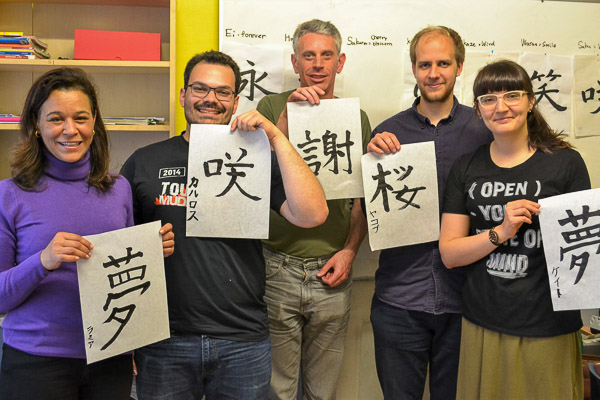
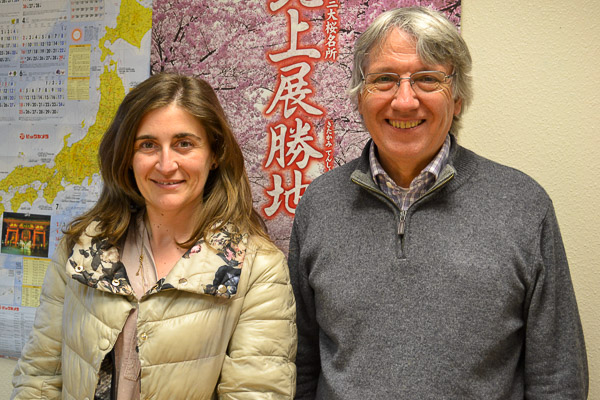
In the last year, though the grammar becomes more complex, I find I’m getting a much better grasp on individual nuances and a better understanding of what is really meant by a sentence or phrase. Much practice is definitely needed, but it’s fun and I plan to keep learning and grow my confidence in speaking comfortably. In the last year the focus as very much been on correct grammar and with this as a strong foundation, with the addition of vocab continuing on, I can envisage a future full of interesting and diverse conversations in Japanese.
Outside of class I find that written homework poses the most challenges, as it forces me to use grammar that maybe I thought I knew, but where I struggle I can realise my weaknesses and provides the opportunity to double check. I also use an app to make vocab lists, sometimes testing myself on the tube, but am fairly disciplined about making time to do my homework where a little commitment is needed!
Laurence 19/05/2017
I studied with ITO Japanese School for a year and a half, after becoming attached to the language through my own self study of it. At first, I decided to try classes for fun. After gaining confidence in Japanese I later thought that it would be nice to continue my studies in Japan itself so now I have arranged to study in a Japan city. My class was 3- 4 people so I was happy with the time dedicated towards each student. Classes were fully conversational, with students expected to learn reading and vocabulary outside of class. My speaking ability improved quite quickly in a short time so I was very happy to have studied with ITO school.
Franco 19/03/2017
Crash Course
I took the course to start learning Japanese, so that on my next visit to Japan I can make a good effort at some basic conversation, out of politeness and respect for the Japanese people.
The course consisted of 10 classes comprising one teacher (Ai Sato) and two of us students, spread over a period of two months. I was happy with Ai-san’s teaching method including the printed materials that were provided.
I have not yet returned to Japan since the course, but hope to do so later this year.
I would prefer in future to have just one class per week, so that I can spend more time revising between classes. We covered a lot of vocabulary in these 10 lessons, so my focus would now be on memorising and becoming more confident in what has already been learnt, before going on to learn new topics.
Roger 08/06/2017

